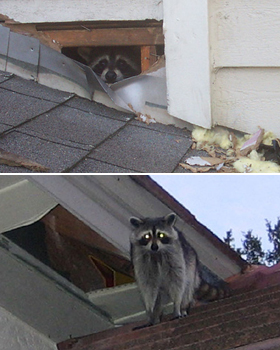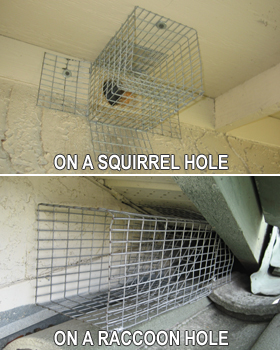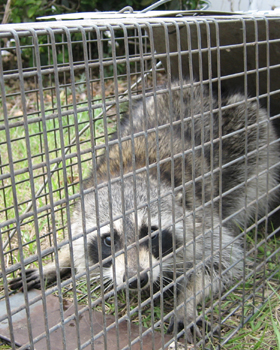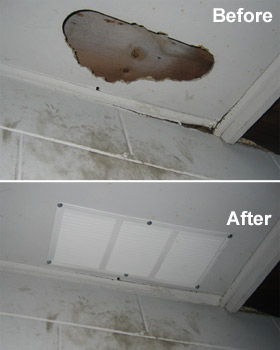DO THEY EVEN ANSWER THE PHONE? - A responsive company is best. What if you need help with a caged raccoon on a Sunday? You want a company that always answers the phone when you call. A company that answers
is a good indicator of overall organization and quality services performed.
ARE YOU TALKING TO THE PROFESSIONAL, OR JUST AN ANSWERING SERVICE? - Some companies hire answering services. That's fine, but these answering services are trained to be very polite and good at sales. It does not
mean that the person actually doing the wildlife work is equally polite or organized. If possible, speak with the person who will be doing the work at your home. If not, you can certainly ask the phone representative to describe the methods
of the person who will come to your house.
OVERALL DEMEANOR - Aside from the answers to specific questions, determine if you feel comfortable talking to the person. A person's voice and demeanor can signal a great amount of information. We've talked to
hundreds of wildlife companies at this point. Well-spoken, educated, friendly, and patient voices correlate with better, more humane work.
DO THEY DESCRIBE THEIR PROCESS? - Explain your problem. A good wildlife operator will listen, and describe how they will solve the problem. Pay attention to signs of expertise. Does the person discuss causes for the
problem and outline a solution? Many companies are truly ignorant about proper methods, and that lack of knowledge will show when talking to them.
Specific questions to potentially ask
Do you perform exclusions when possible? - The answer should be yes. In most cases, it's better to merely exclude the animals, via elimination of entry holes and installation of one-way exclusion doors. This is the least
stressful on the animals, and extremely effective in most situations. Far better than cage trapping and relocation.
Do you perform damage repairs? - The answer should be yes. If you have animals inside your house or building, it's imperative to find all the entry holes, and seal them shut.
Do you warrantee your repairs against re-entry? - The answer should be yes, for at least one year.
Do you perform waste cleanup? - If this is a concern of yours, and you think it's warranted in your situation, then you want the answer to be yes.
Could there be a nest of babies in the attic? - If you have animals in the attic, your operator had better be well aware that there's a very high (85% or higher) chance that there's a litter of baby animals in the attic. He
should know how to deal with this properly, without abandoning the young to starve and die in the attic.
Are you fully licensed and insured? - The answer should be yes.
Have you handled a situation like this before? - You do want an experienced wildlife operator. That is, after all, why you are hiring a professional - for their knowledge and experience in dealing with a situation like yours.
Are you available 24/7? - The answer should be yes, particularly if there's any type of cage trapping going on, in which an animal can get trapped on a weekend.
Do you perform cage trapping and relocation? - The answer should be no, except for specific difficult cases. In general, cage trapping is inhumane. In many states, law requires that the animal be euthanized. Relocation
is also not always a good answer, because it can be very stressful on the wildlife, both the one introduced to new habitat, and the existing wildlife already in the area. If possible, a wildlife company should use on-site exclusion instead of trapping.
Do you ever use poisons? - Most definitely no! Never hire any company that would employ the use of poisons to solve a wildlife conflict.
Do you use lethal traps? - Definitely no. There is no reason for them in the vast majority of wildlife conflict situations. Most of them are difficult to ensure a quick kill, and are often extremely inhumane.
Do you use glue traps? - Another big no. These are the most inhumane devices created in the field of rodent or wildlife control.
Can you provide references? - The answer should be yes, but this is starting to push it. Hopefully you can tell from all of the above questions if a company will do good work.
What are your rates? - For many situations, the wildlife operator cannot give a price over the phone until he sees the exact situation. Still, many of the ethical companies, if you're dealing with a straight shooter, can say,
"well, I don't know for sure, but your type of situation typically runs in the $400 - $700 range, with prices higher if extensive repair work is necessary". Some companies offer free estimates, some charge a service and inspection fee that is
applied to the total job quote.
Finally:
Are you humane to wildlife? - You can just come right out and ask! The answer they give should tell you a lot of what you need to know.
Upon arrival and during/after the inspection
A written contract - The wildlife operator should provide a written contract and service agreement with terms of the job. It should not include an open-ended clause for charge-per-animal-trapped, as that just encourages a company
to trap every non-target critter in the neighborhood. No company should request up-front payment. At most, a 50% down payment, or just payment of the initial service fee.
Uncomfortable? Don't hire! - If you get any impression that the worker who comes out will not do a fair and competent job, or will not treat wildlife humanely, thank them for the quote and say you will be in touch. Never be pressured
into paying for service that you do not desire. And remember, prices for professional service, which can include ladder work, roof work, biohazard, handling wildlife, travel expenses, special
licensing and insurance, business expenses, will not necessarily
be cheap. Read more about
wildlife removal priceshere. Which is why it's great if you can resolve the problem yourself for free.
For effective ways to solve a raccoon problem yourself, or to find local help, click the below buttons:




